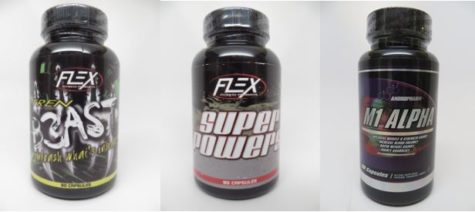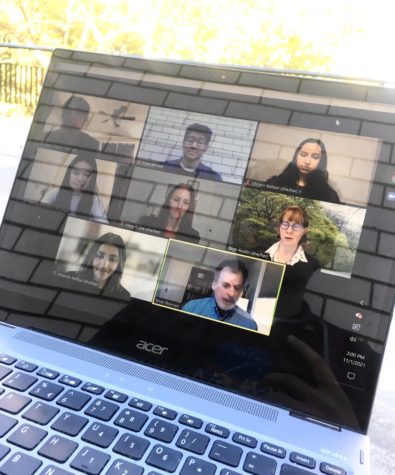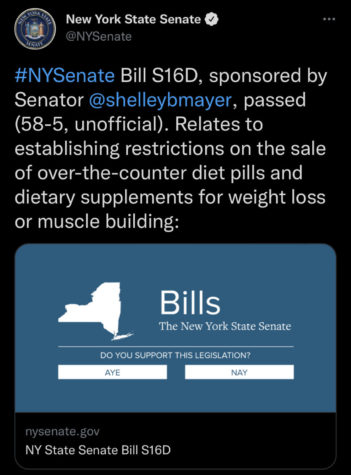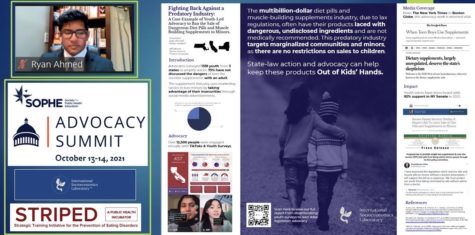Student Advocates Lead the Way to Ban Minors from Purchasing Diet Pills and Muscle-Building Supplements
Youth are turning to dangerous diet pills and muscle-building supplements that are underregulated by the FDA. Thus, students across the country are collaborating on advocacy at the state-level to keep these products out of kids’ hands.
Wikimedia Commons / Creative Commons Attribution 2.0
“This bill has an intention to protect the health of younger residents who may not know what they’re purchasing and what it would cause to their bodies,” said Senator Joseph Addabbo Jr. in regards to the S16D & A431C legislation.
The use of over-the-counter diet pills and muscle-building supplement products have only gained popularity during the COVID-19 pandemic, when the amount of time young people spent online skyrocketed. It goes without saying that mental health issues increased due to the pandemic, and now more than ever, young people are turning to these products in hopes that they would help them to feel better about themselves. Thus, a team of students across the country is collaborating on policy translation to lead bills in the states of Massachusetts, New York, and California in order to keep these dangerous products out of kids’ hands.
Just earlier in November 2021, the BBC reported on doctors issuing a major alert on the dangers of the ‘online dry scooping workout trend.’ There are hundreds of videos appearing across the TikTok platform with millions of viewers displaying youth consuming dangerous unregulated workout supplements. This summer, it shook the world when a social media influencer in the United States, Briatney Portillo, became a victim of the trend and was hospitalized due to a devastating heart attack.

“These products are not rigorously regulated by the Food and Drug Administration, as these products may very likely be laced with dangerous chemicals and steroids with little oversight,” said Mr. Mark Oakley, a former GNC sales associate. “Most muscle-building supplements contain extremely high levels of caffeine, typically 250 mg to 300 mg, which surpass normal amounts of caffeine. For example, an 8 fluid ounce cup of coffee has approximately 95 mg of caffeine.”
The issue only gets deeper when body insecurity, mental illness, and more are on the rise, as the United States has been plagued by an upward trend of youth eating disorders over the past few decades.
Dr. S. Bryn Austin, Professor at the Harvard Chan School of Public Health, has been studying the effects of eating disorders through her research. She said, “Government oversight on dietary supplements is unacceptably weak, and as a result, unscrupulous manufacturers are taking advantage of the weak federal regulation.”
“Study after study has documented that particularly supplements sold for weight loss and muscle building are often laced with dangerous and illegal ingredients, including banned and undisclosed pharmaceuticals, anabolic steroids, and experimental and excessive stimulants. The American Academy of Pediatrics has strongly cautioned against teens using these products for any reason,” adds Dr. Austin.
Currently, youth advocates are actively working on bills in the three states to address this issue. New York Assembly Bill A431C was introduced by Assemblymember Nily Rozic and Senate bill S16D introduced by Senator Shelley Mayer aimed to restrict the sale of over-the-counter supplements to minors. The State Senate bill got an overwhelming 92% of support, while similar bills such as California’s Assembly Bill 1341 and Massachusetts’ H.2331 and S.1525 are making fast progress.

“I voted in favor of this bill and continue to support it. Placing an age-based restriction on the purchase of these products is an appropriate way to control their use, and possible misuse, among minors,” said Senator Patrick Gallivan.
“I do not see much opposition to this, even if the local nutrition store would argue. They are not going to lose millions of dollars for this bill. They are not going to go out of business because of this bill. They actually should be in favor of it, because they would be protecting their own consumers. So I am hopeful that the Assembly does pass this bill, and then we will pass it in the Senate again hopefully in 2022,” said Senator Joseph Addabbo in response to this bill’s deliberation in New York State.
As a response to the issue, youth advocates at the Strategic Training Initiative for the Prevention of Eating Disorders (STRIPED) at the Harvard Chan School of Public Health surveyed over 1,500 adolescents from Massachusetts, New York, and California. Among those adolescents, many reported to have first used these products as young as thirteen years old. Moreover, 75% of adolescents claimed to not have been warned by an adult before using these products, and many reported that these products are very accessible.
Aside from their dissemination of youth surveys, the advocates have engaged over 12,000 viewers on Tiktok through video. These stories on the advocacy work have also made headlines in renowned newspapers from The New York Times to The Boston Globe.
Ryan Curran, a senior at Archbishop Molloy High School in New York, has been taking a lead in public health issues such as this one. He is a youth advocate who has played an incremental role in speaking to lawmakers in his state about the dangers of diet pills and muscle-building supplements.

“When advocating for this, I learned to not be afraid if Senators had questions,” said Curran. “I took part in meetings with my representatives as a witness of this issue among youth. As I slowly gained experience, I had the opportunity to give closing statements. Being able to speak up, I was able to make a bigger impact on Senators and their staff by developing my interaction with them while speaking.”
“This legislation would have a positive impact on my constituents and their families,” said Senator Jeremy Cooney in response to the youth advocates. “It is important to prioritize the physical and mental health of our community members when creating and voting on legislation, like the NY S16D bill.”
To further strengthen the advocacy work towards this bill, Senator Addabbo said in our interview, “When you reach out to me as a constituent, I take it very seriously. Just like how I responded back to you, I hope my other colleagues do the same when they hear from their constituents about a bill. If I get one constituent reaching out to me, it means a lot. If I get more — 5, 10, 15, or 20 — I take it that much more seriously. You know even if Bronx Science students would reach out to their state representatives, it could make a difference.”
This bill will be further voted on in the 2022 state legislative sessions in California as Assembly Bill CA-1341 championed by Cristina Garcia, as it passed with overwhelming support from Assembly members through all of the committees that it had been reviewed in the prior session. The same could be said about the bill to regulate the sale of these products in Massachusetts, as it is currently being decided on by state legislators in this ongoing session.
A recent Facebook whistleblower exposed a report on social media, particularly the content-selection algorithms of Instagram causing insecurities that harm young females. Taking advantage of this, diet pills and muscle-building supplements make up a multi-billion dollar industry, even sponsoring the same influencers that youngsters look up to and fueling advertising campaigns in marketing towards the marginalized communities.

However, this issue affects boys as well, as they are being flooded with advertising seeing celebrities saying that the panacea to all of this was these supplement products. Their advertisements reading:
“Lose 20 pounds in one month.”
“Feed the machine.”
“Just Be a Man.”
“Get bigger every day.”
“During my time in sales for supplement companies, many kids have asked the daunting frequently-asked question of ‘What’s the strongest supplement you have?,’ has led me to further believe that these products had been heavily marketed towards young people,” said Mr. Pavel Hablyuk, a former sales representative of PERFORMIX.

In addition to regulating sales of diet pills and muscle-building supplements, much work is needed in terms of education to ensure that students receive adequate education on the dangers of using these products that contain toxic and unregulated ingredients. On top of teaching children about the dangers of drugs and alcohol, information about eating disorders, diets, and muscle supplement use can be presented as a preventative measure in response to this issue.
New York Senator Cooney addressed the youth in our community, “Make your voices heard! Email and call your state assembly representatives. Let them know why this bill is important and that it should be a priority in the upcoming legislative session. You can find the representatives for the district you live in here: Assembly Member Search | New York State Assembly (nyassembly.gov). Also, advocate for this legislation with your friends and family, ask them to contact their representatives as well. Help spread the word so your fellow community members know and care about it, too.”
If you are a member of the youth in the United States who would like to play an instrumental role in being a part of the many voices for restricting the sale of diet pills and muscle-building supplements to minors, have your voices heard by lawmakers through the Youth-Survey and Sign-On Letter.
A team of students across the country is collaborating on policy translation to lead bills in the states of Massachusetts, New York, and California in order to keep these dangerous products out of kids’ hands.
Ryan Ahmed is a Managing Editor for 'The Science Survey.' He wants to uplift communities and provide unique insight on current events around the globe...

